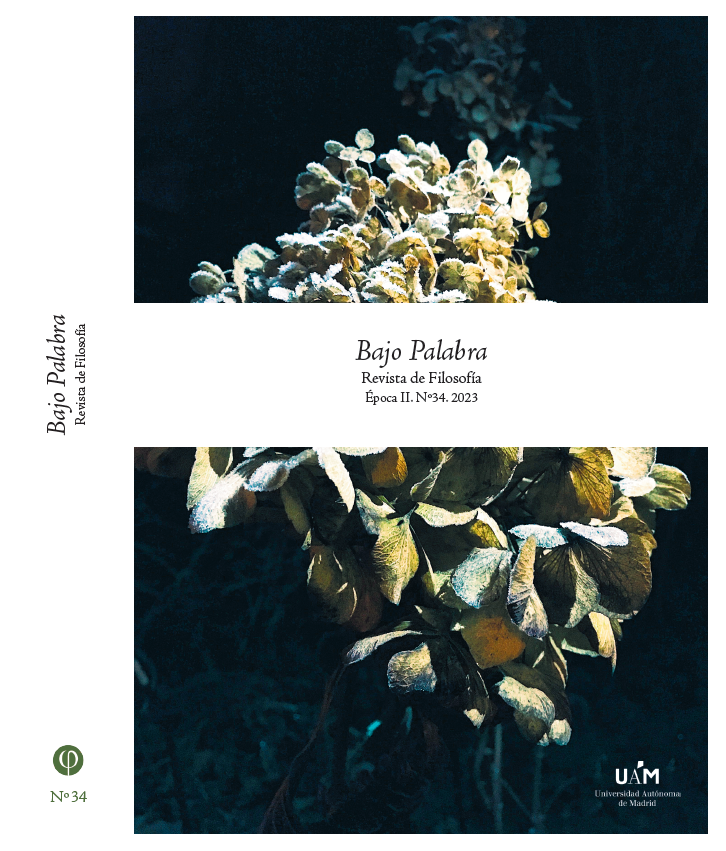Keywords:
Descartes, Humor, Juan Luis Vives, Laughter, ModernityCopyright (c) 2023 Vicente Raga Rosaleny

This work is licensed under a Creative Commons Attribution 4.0 International License.
Abstract
The philosophical tradition hasn’t consistently focused on laughter, but some thinkers have attempted to theorize about it. A modern example of this is Descartes, who, in Passions of the Soul, dedicates some sections to reflect on laughter, with the peculiarity that, in those passages, he mentions the name and work of the Spanish humanist Juan Luis Vives. The comparison between both sheds light on the phenomenon of laughter and the problems that philosophy encounters when addressing it.
Downloads
References
Aristóteles, Metafísica, Madrid, Gredos, 1994.
Bergson, H., La risa, Buenos Aires, Losada, 2003.
Brown, D., “What Part of ‘Know’ Don’t You Understand?”, The Monist, 88 (1), 2005, pp. 11-35. https://doi.org/10.5840/monist20058813
Burton, R., Anatomía de la melancolía, Madrid, Asociación española de neuropsiquiatría, 1997.
Casini, L., “Juan Luis Vives and Early Modern Psychology: A Critical Reapprai- sal”, en P. J. J. M. Bakker & S. W. de Boer (eds.), Psychology and the Other Disciplines: A Case of Cross-Disciplinary Interaction (1250-1750), Leiden & Boston, Brill, 2012, pp. 81-150.
Critchley, S., Sobre el humor, Torrelavega, Quálea, 2010. Descartes, R., Las pasiones del alma, Madrid, Tecnos, 2006.
Descartes, R., Correspondencia con Isabel de Bohemia y otras cartas, Barcelona, Alba, 1999.
Descartes, R., Œuvres complètes, Paris, Vrin, 1996.
Descartes, R., Les Passions de l’Ame, Paris, Vrin, 1970.
Eagleton, T., Humor, Barcelona, Taurus, 2021.
Freud, S., Obras completas Vol. VIII: El chiste y su relación con lo inconsciente (1905), Buenos Aires, Amorrortu, 1979.
González Romero, F., Pasiones, amor y compasión en la construcción del sujeto moderno. Los predecesores de Descartes. Siglos XVI y XVII, Madrid, Universidad Pontificia de Comillas, 2012.
Koestler, A., The Act of Creation, New York, MacMillan, 1964.
Lázaro, M., “La risa en Francisco Suárez. El paso de la Edad Media al Barroco”, Anales del Seminario de Historia de la Filosofía, 29 (1), 2012, pp. 65-96. https:// doi.org/10.5209/rev_ASHF.2012.v29.n1.39455
Malcolm, N., Ludwig Wittgenstein, Madrid, Mondadori, 1990.
Marion, J.-L., Cuestiones cartesianas, Buenos Aires, Prometeo libros, 2012.
Morreall, J., The Philosophy of Laughter and Humor, Albany, State University of New York Press, 1987.
Morreall, J., Taking Laughter Seriously, Albany, State University of New York Press, 1983.
Nietzsche, F., La voluntad de poder, Madrid, EDAF, 2000. Nietzsche, F., Humano, demasiado humano, Madrid, Akal, 1996.
Perler, D., Feelings Transformed. Philosophical Theories of the Emotions, 1270- 1670, Oxford, Oxford University Press, 2018.
Plessner, H., La risa y el llanto. Investigación sobre los límites del comportamiento humano, Madrid, Trotta, 2007.
Raga-Rosaleny, V., “Una ciencia admirable: filosofía y admiración en Descartes”, Filosofía Unisinos, 22 (3), 2021, pp. 1-12. https://doi.org/10.4013/ fsu.2021.223.08
Renault, L., Descartes ou la félicité volontaire, Paris, PUF, 2000.
Rodis-Lewis, G., “Une source inexplorée du Traité des Passions”, Revue Philosophique de la France et de l’Étranger, 138, 1948, pp. 330-334.
Skinner, Q., “Why Laughing Mattered in the Renaissance: The Second Henry Tudor Memorial Lecture”, History of Political Thought, 22 (3), 2001, pp. 418- 447.
Spinoza, B., Ética demostrada según el orden geométrico, Madrid, Tecnos, 2007. Tomás de Aquino, Suma de Teología, vol. 2, Madrid, BAC, 2001.
Vives, J. L., El alma y la vida, Valencia, Ayuntamiento de Valencia, 1992. Vives, J. L., Opera Omnia, Valencia, Monfort, 1782-1790.

